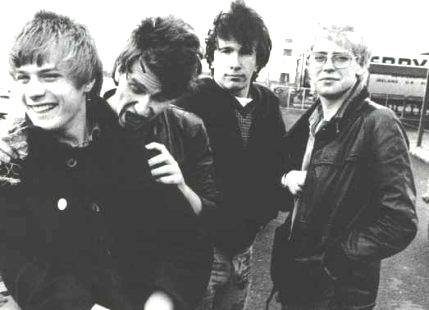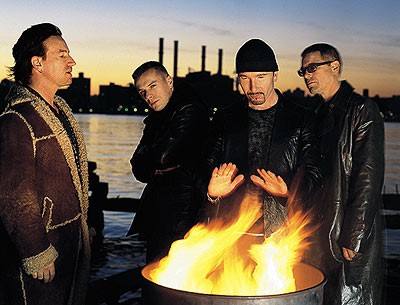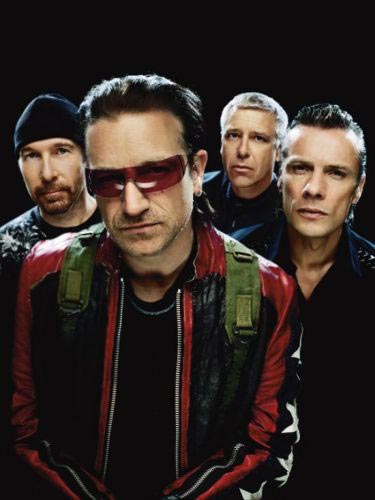U2's Best Music
July 14, 2011 by Somebody Else
For anyone who has only been paying the most casual amount of attention, it is overwhelmingly obvious that the Irish band U2 has, for a considerable period of time, been rock and roll's most widely acclaimed group, both in the United States and internationally. They have been so popular for so long, have sold so many records, have been taken so seriously by so many heads of state when making efforts to draw attention to the causes they champion, that it would not be an exaggeration to assert that they have passed beyond the bounds of mere rock superstardom, and have now become an international institution, kind of like a rock-and-roll United Nations or something.
Which is to say that when they release a new album -- something that doesn't happen all that often these days -- it can pretty much be guaranteed to go platinum in ten minutes thanks to the band's stellar reputation, and regardless of the quality of music on it. So many people just can't wait to hear the latest offering from their beloved heroes, and for that very reason, a great number of record buyers may be more focused upon simply getting the latest U2 release than in finding out how good it actually is. The not uncommon assumption is that if the CD is by U2, they will like it, end of discussion.
And to be fair, U2's latest releases have not been bad. In fact, I can readily admit that they have been pretty good. Some serious effort has gone into them. There are some nice guitar riffs, inspiring melodies, thought-provoking lyrics, etc. Massive fame and recognition have not destroyed their creative abilities by any means. No, it is abundantly clear that they are still dedicated musicians who love their craft for its own sake, who play their music because that is what they love doing, and who are still striving to express themselves in ways that will get the hairs on our arms to stand on end.
And yet, still, I must confess that for me personally, many years have gone by since U2 stopped being my musical heroes, and instead became everyone else's.
What happened? Why have I found it impossible to jump on the bandwagon with practically everyone else and really get into their latest releases? Have I changed? Or did the U2 that I once listened to in awe, did they change?
To answer this question, let's go back into the past and start from the beginning.
U2's first album, Boy, was released in 1980. At that time, they were very young, in their late teens or early twenties. By their own admission, they had only been playing their instruments for a few years. It was also fairly evident that, from a purely technical point of view, their musical abilities were rather limited. No earth‑shattering Jimmy-Page-style guitar solos from The Edge. No soaring, Robert-Plant-style vocals from Bono. As for Adam Clayton on bass and Larry Mullen, Jr. on drums, there was nothing there either that -- again, technically speaking -- was particularly exceptional.

Still, the pieces all fit together quite well. And perhaps that more than anything else explains the band's remarkable success over the long term -- their remarkably balanced sound, in which vocals, guitar, bass, and drums fit together in such a cohesive and effective way, in which no one musician dominates over another, in which the group is always so much greater than the sum of its individual parts, in which the understated simplicity of their approach somehow manages to work so well for them.
Boy was not an album that took the world by storm. It was a modestly successful debut and did get the band some attention in Ireland, the UK, and the USA. But it was hardly the harbinger of greater things to come, except for those who were exceptionally perceptive at the time.
The album had a few tunes that enjoyed a small amount of mainstream success, such as "I Will Follow," probably the most elemental offering on the album, and possibly the most basic song the band has ever come up with, so primitive, in fact, that when I was seventeen and just getting started on guitar, I learned how to play it by ear in just a few minutes. It does sound like something that a seventeen-year-old guitar novice might come up with -- the dead seriousness of it, and the earnest drama of the love declaration, all in the context of a very juvenile-sounding guitar riff. If Romeo had been living in Ireland in 1980, he might have come up with something like that for Juliet.
Another song that earned the band some popular recognition was "Out of Control," another anthem to the adolescent spirit, but somewhat more complex in its structure. It's rather catchy, and showed that U2 knew how to put together simple, well-crafted songs with compelling and memorable melodies.
Another song from Boy worth commenting on is "Twilight," which showcased The Edge's unique guitar playing style at its best - minimal, sparse, solid, and captivating. No guitar solos. No fancy riffs. No blues notes. He was the antithesis of the rock and roll guitar god of the 1960s and 1970s.
"Twilight" also highlighted Adam Clayton's innovative bass playing, which here avoids the easy route of mirroring the guitar part, and instead provides a separate melody that links closely with the drum beat. Never superfluous in U2's music, from the beginning, Clayton established his bass line as an essential melodic component for all of the band's songs.
Certainly, at that time, the simplicity and unpretentiousness of U2's music was in line with some pop music trends of the day. But it wasn't so much that they were making a conscious decision to follow the latest musical zeitgeist, as it was that the latest musical zeitgeist had snatched them up. With their musical limitations, they really didn't know how to play any other way. My guess is that if they had come up with their sound in 1975, only five years earlier, they would have released one album only, and we would have never heard from them again.
In any case, Boy, although by no means a blockbuster release, garnered enough attention to ensure that another album would be forthcoming. This happened the next year, in 1981, with October, which in comparison to its predecessor was a relative failure in terms of album sales. To this day, it has sold fewer copies than any of the band's other albums. At that point, it might have seemed that U2 had reached the end of their road as a mainstream act.
In retrospect, it is easier to see that October, which for all intents and purposes is a Christian-themed album, marks the beginning of U2's rather unique identity as a rock-and-roll group playing religiously tinged music, rather than a religious group playing rock-and-roll tinged music, with the latter variety being the dominant one up to the present day. Rock and roll was never supposed to be about religion, so the unspoken argument went, but U2 begged to differ. The customarily hard line separating faith and cutting-edge pop music ended up kind of blurred on that album.
At that point, it wasn't easy to know what to make of U2. In "Twilight," Bono sings: "In the shadows, boy meets man." Some people figured it was a literal reference to pedophilia instead of taking it as an allegorical image of the passage from adolescence to manhood. Other songs on Boy, such as "An Cat Dubh,"which alludes to an uncomfortable intimate encounter in imprecise language, gave some listeners the impression that the group was all about an alternative sexual lifestyle. The UK album cover showing a shirtless young boy perhaps reinforced this impression. Looking back, it seems fairly evident that it is a poetic exploration of youth and maturity rather than an album primarily about sexual themes. But since U2 was relatively unknown in 1980, it was understandable that the album would end up being widely misinterpreted.
Similarly, certain Christians felt than October was proof that U2 was firmly in their camp. And truth be told, it very well may be their most overtly religious album. Still, it is a far cry from the stuff you hear these days on Christian rock stations. If anything, October is a new-wave influenced album with a lot of biblically inspired lyrics and themes. But as always with U2, religion and spirituality are put to the service of music, rather than the other way around. All the dedicated Christians out there who feel that October fits in quite well with the rest of their music collection should bear in mind that U2 probably never intended to become a staple of Christian radio.
I personally like October, but must admit that it is not an album for casual listening. You have to be in a reflective mood to appreciate it, and you should probably listen to it from one end to the other several times to get the full effect. It is a meditative album without any radio-friendly songs, except for possibly "Gloria," which has the feel of a concert song, and in fact was a concert favorite for the band during the 1980s.
October also showed that the band was broadening its palette of sonic experimentation. The Edge, who would steadily evolve into a sound effects magician of sorts, pares down the complexity of his playing and places more emphasis on the ambience created by the evocative sounds coming from his heavily processed instrument. His guitar, so prominent and straightforward on Boy, has become more subtle and impressionistic. This trend would deepen on subsequent albums.
I personally was not at all aware of U2 at the time of their debut and second release. When October came out, I had just become a teenager, U2 was not being played much on the radio, and as far as I can recall had yet to make their first MTV video. Since I had no disposable income and no friends who actively collected new records, the opportunity for me to find out more about this new Irish group did not present itself. But within two years, this would change.
The album War was released in early 1983. I knew nothing about this when it happened. But I did most definitely notice the MTV video for "New Year's Day," the song that thrust U2 into the international spotlight, where they have pretty much remained ever since. However, let's not forget that this spotlight did not burn so brightly nor focus so intently upon them at first.
"New Year's Day" is a great song with a fierce, driving beat and relentless bass line, a unique and deeply moving guitar solo, and a strong and touching vocal performance. The MTV video for the song is stunning, with its mystical shots of our musical heroes journeying solemnly through snowy landscapes. But that's essentially all there was to it at the time for video viewers like me -- an awesome tune and a very cool video. MTV was a growing phenomenon, and U2 was a part of that phenomenon. In those days, I was probably thinking, "Wow, MTV sure has some amazing stuff," instead of, "Wow, what an amazing group this is." But other people were indeed taking notice of the band.
I had a friend at the time that had turned me on to some great music. One day I asked him what he'd been listening to lately, and he responded: "I've really been getting into an album by this band called U2. It's called War, and it's got the song on it for that video that you see all the time on MTV, 'New Year's Day.' But there are a lot of other tunes on there that are just as good, maybe even better than that one."

My birthday came up, and I asked for a Sony Walkman and for some music at the local record store. One of the albums that I got was War, as a cassette tape. It turned into my constant companion for several months, during which time I played it over and over, side to side.
War turned out to be U2's breakthrough album, largely owing to the success of "New Year's Day" and "Sunday Bloody Sunday," both of which went into heavy rotation on MTV for a considerable period of time. But for those of us who had bought the album and dedicated ourselves to listening to it regularly, we discovered that the entire release was a strong one. I definitely rate "Seconds," "Drowning Man" and "Surrender" -- introspective, meditative tunes -- as among some of my very favorite songs by the band.
Through talking to a few friends and doing a bit of magazine reading, I found out that the album had a lot to do with the terrible, violent battle then raging in Ireland between Catholics and Protestants, a controversy that centered -- and still does -- around the existence of UK-controlled Northern Ireland, which many in Ireland proper consider to rightfully be Irish territory. So, a lot of War's lyrical content can be understood as commentary on that religious and political conflict, not taking sides on it, but rather condemning the entire dispute altogether.
However, the lyrics are non-specific enough to allow the listener to apply the anti‑war messages to any kind of brutal and tragic confrontation, whether on the battlefields of the world, or in the "trenches of our hearts," as "Sunday Bloody Sunday" points out.
So, with that album, U2 came across as more than simply a rock band. Instead, they were more like rock-and-roll spokespersons for a suffering young Irish generation that found itself being sucked into a centuries-old conflict that many or perhaps most wanted no part of.
Since traditional, institutionalized religion did not seem to be providing any real answers or solutions to the ongoing tragedy, Bono appointed himself as a non-ordained pop-music minister of sorts, weaving biblical content into War's music, which amounted to a radical re-contextualization of religious thought. In pointed defiance of fundamentalist arch-conservatives with blood on their hands, hell-bent on preserving the status quo at all costs, using religion as a tool to keep the bullets flying and the bombs exploding, U2 re-appropriated the spiritual message of Christianity, demonstrating that it belongs to the lovers of peace rather than the architects of war, and shunning the all-too-typical fundamentalist attitude that characterizes so much religious music.
As someone who had been massively turned-off by the stiff-necked exclusivity of Protestant Christianity as I had seen it practiced in the United States -- essentially, the assertion that if you do not believe as I do, you will go to hell -- War was a real revelation. It opened my mind to the idea that the problem with religion lay not with the Bible itself, but rather with people who interpret its words to fit their selfish and destructive agendas. I wondered what it might feel like to "Surrender" myself to a spiritual feeling based upon peace and love, rather than one centered upon a desire to belong to an elite group supposedly safe from the flames of hell.
Beyond the depth and daring of its lyrical messages, the album also features some of the band's finest music. The arrangements, generally sparse, create an ambience of stark drama, at times agonizing and outraged, at other moments serene and enraptured. I wondered how the group could adequately follow up such a landmark performance. I would not have to wait too long for my answer.
Released in 1984, The Unforgettable Fire is, in my view, U2's best album ever. I am the first to admit that this is a purely personal and subjective viewpoint, and that most music critics will take issue with it, but I cannot change my convictions for the sake of pleasing others.
Moving away from the stridently political stance of their previous release, the band created a collection of almost entirely introspective songs, all of which were lushly produced by Brian Eno. The sonic experimentation of The Edge, cautiously dabbled with on previous albums, here reaches its fullest expression. There are moments, such as the song "Wire," where it is extremely difficult to imagine how the guitar part was played owing to heaviness of the sound processing. The Edge is moved down quite a bit in the mix, and Adam Clayton's bass guitar is given tremendous heft and power. To this day, I have not heard a recorded bass guitar sound to equal it, not even on Joshua Tree, the group's subsequent album, which Eno also produced. And Bono gives some of his best performances, particularly the highly improvisational and minimalist "Elvis Presley and America," which goes to show that a rather simple "musical sketch" -- as Bono himself has labeled the song -- can still make for an unforgettable recording.
There was only one hit song off the album, "Pride (in the Name of Love)," which is not such a bad tune, but was so played into the ground in the mid-1980s on MTV and the radio that even now I think that I have yet to fully recover from the overexposure. Also, I was obligated to sing it with a cover band that I was briefly associated with, and the strain that it put on my voice to hit the higher notes was a discouraging experience that I'd rather forget.
This one hit song aside, the meditative, almost otherworldly vibe of the album as a whole is why I like it so much. I found that I could completely lose myself in it. I would walk around town for hours on end, listening to it on my Walkman, playing it over and over from front to back. It put me in touch with deep feelings that I couldn't put into words or adequately explain. When I listen to the album today, it transports me back to those solitary teenage moments, to memories of feelings that I am no longer able to call up, probably because I can no longer put myself into that particular frame of mind. I suppose that I've become far too practical and logical, and have largely lost the dreamy and starry-eyed temperament I once had.
In 1986, the time came for me to graduate from high school and go to college, which somehow seemed to extinguish the imaginative and introspective flame that I'd been trying to keep burning within since I'd first heard The Unforgettable Fire. My first year of college was stressful and extremely depressing. I had heard rumors that U2 was about to release a new album, and so I looked forward to it with probably far too much hope and expectation. I was setting myself up for disappointment.
Joshua Tree was released in the spring of 1987, and it proved to be U2's defining moment, at least as far as the record-buying public as a whole was concerned. The album is so well-known that I will refrain from commenting much on it here. It was lauded in the magazines. It was called by some the album of the decade, and on and on.
"With or Without You" dominated MTV for a few months, and while I must admit that it is a stirring, dramatic song, I cannot identify much with the overwrought emotion it conveys.
As on "Seconds," U2 explores the theme of nuclear holocaust with "Bullet the Blue Sky," but not as compellingly, in my humble opinion.
The rest of the songs are good, but not, in my view, spectacularly so.
I listened to the album for a while, but tired of it fairly quickly, and after a few months lent my cassette to a friend and never saw it again. It was not particularly missed. The rest of the world got caught up in U2 mania, while I mourned the loss of the musicians who had up to that point created some of my favorite music.

Over the years, I did buy subsequent releases by the band, and in particular enjoyed Achtung Baby (1991). Notwithstanding, I really haven't gotten as much satisfaction out of being their fan since Joshua Tree as I did before that album's release, when I thought they were awesome and most people I knew only considered them to be just another rock group with a video or two on MTV.
I guess it's appealing to us as music critics when we feel we have discovered a special musical act that most others have passed over or have simply not yet had a chance to hear. When everyone else discovers what you knew all along, you feel like you should move on to find the next great act that most people don't know about.
The funny thing is that I didn't feel any special vindication when U2 became megastars. On the contrary, I kind of wished that they had somehow been able to stay a bit more under the radar, maybe more like Bob Dylan, famous and influential, but not at overblown and exaggerated levels. But, alas, it is too late. There appears to be no way to recapture that amazing vibe from 30 years ago. And the band itself, despite all of its fame and success selling its latest albums, is probably more acutely aware of this fact than I am.
Copyright 2011 by Somebody's Webpage







